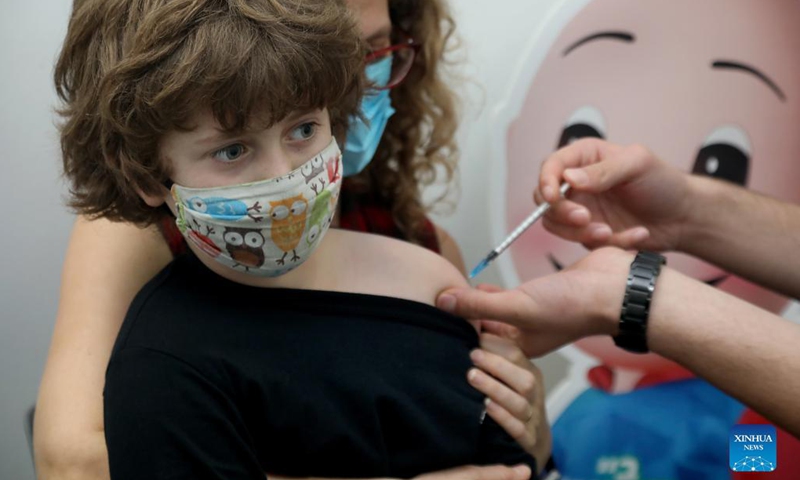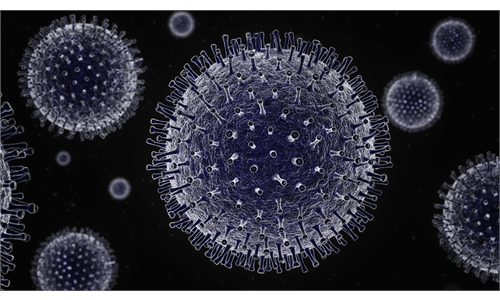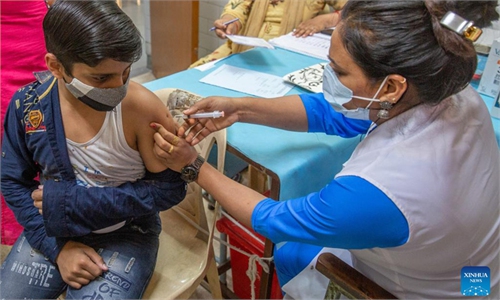Acute hepatitis in children of unknown cause may be associated with the super antigen of the Coronavirus: study

A child receives the COVID-19 vaccine in Tel Aviv, Israel, on November 25, 2021. Photo: Xinhua News Agency
More than 300 cases of acute hepatitis in children of unknown cause in more than 20 countries and regions around the world may be associated with the super antigen of the Coronavirus, according to the latest study published in the prestigious international academic journal, The Lancet Gastroenterology and Hepatology.
At least 348 cases of severe acute hepatitis of unknown cause in children have been reported in several countries including the UK, the EU, the US, Israel and Japan according to media reports.
Most children develop gastrointestinal symptoms early, then jaundice and, in some cases, acute liver failure. However, hepatitis viruses A, B, C, D and E were not found in the reported cases.
The researchers suggest that the recent cases of acute hepatitis in children were probably the result of a coronavirus infection, followed by an adenovirus infection after the emergence of a viral reservoir in the intestinal tract.
After infection with Coronavirus, the reservoir of viruses may lead to repeated super-antigen-mediated immune cell activation, such as the Multisystem Inflammatory Syndrome in Children (MIS-C). If such a reservoir is present and the child subsequently becomes infected with adenovirus (AdV), this superantigen-mediated effect may be more pronounced and may lead to immune abnormalities such as the recently reported acute severe hepatitis.
Isabella Eckerle, co-Head of the Centre for Emerging Viral Diseases at the Geneva University Hospitals, said the possibility of acute hepatitis in children following COVID-19 infection cannot be ruled out, rather than the AdV pathogenic hypothesis previously proposed by the UK Health Security Agency (UKHSA), in part because no adenovirus was detected in liver biopsies in children with acute hepatitis at the moment.
The persistence of Coronavirus in the gastrointestinal tract of children results in repeated release of viral proteins in intestinal epithelial cells, leading to immune activation, and this superantigen-mediated immune cell activation has been identified as the mechanism of causing MIS-C, according to the research results.
The MIS-C that is highly related to the infection of Coronavirus, which has sparked concerns widely since April 2020, can cause inflammation in multiple organs including the heart, lungs, kidneys, brain, skin, eyes, stomach and liver, and can even lead to multiple organ failure in severe cases, which can cause the death of children.
The researchers noted that continuous monitoring of the feces of children with acute hepatitis is recommended in light of the current situation. If evidence of Coronavirus superantigen-mediated immune activation is found, immunomodulatory therapy should be considered in children with severe acute hepatitis.
Furthermore, Israel recently reported unidentified cases of acute hepatitis in 12 children, 11 of whom had been infected with the Coronavirus within a year, according to the report from the Jerusalem Post.
Israeli medical experts told the media that, after ruling out all possibilities, the common denominator of all the detected cases is the Coronavirus infection around three and a half months before the onset of hepatitis.
Severe Coronavirus infections are known to damage the liver, which means this unidentified hepatitis may be one of the long-term symptoms of COVID-19, medical experts noted.
The WHO Regional Office for Europe reported on May 13 that unexplained acute hepatitis cases in children aged 16 and under in the region also showed that more than 70% had been infected with the Coronavirus.
Among the cases with tracked medical progress, the proportion of severe cases reached 15.4%. Of the cases with COVID-19 vaccination data, 83.9% were not vaccinated.
Medical experts expressed concerns over allowing a new kind of virus to spread uncontrollably in children who are largely unvaccinated without knowing the long-term effects of the Coronavirus.
Global Times


